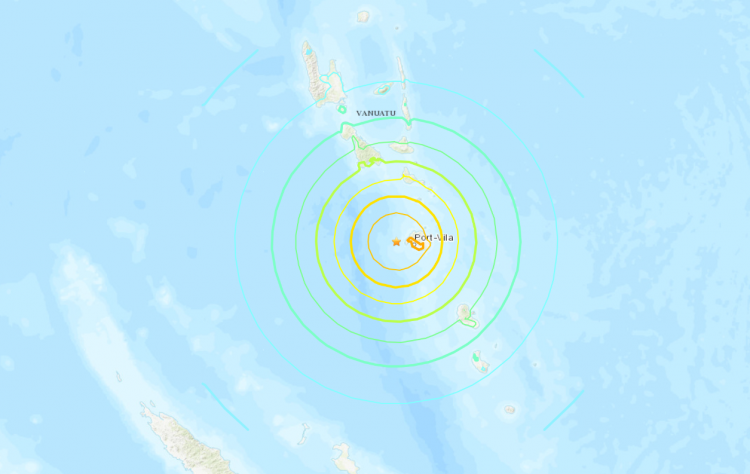A powerful magnitude 7.3 earthquake struck the Pacific island nation of Vanuatu on Tuesday, causing significant damage to homes, businesses, and critical infrastructure, including the U.S. Embassy in the capital city of Port Vila. The quake, centered 30 kilometers west of Port Vila, hit just before 1 p.m. local time at a depth of 57 kilometers, according to the U.S. Geological Survey (USGS).
The earthquake, followed by multiple aftershocks-including a magnitude 5.5-sparked initial fears of a tsunami. While a tsunami warning was quickly lifted within two hours, officials urged residents to remain away from coastal areas as monitoring systems were down due to widespread power outages.
The full extent of the destruction remains unclear as phone lines and internet connectivity were severely disrupted. Unconfirmed reports of casualties began surfacing through social media and limited communication with local witnesses. Reuters reported at least one death and several injuries, while eyewitnesses described chaotic scenes outside Port Vila's main hospital.
"Doctors are working as fast as they can," said journalist Dan McGarry. "I saw three people on gurneys in obvious distress outside the emergency ward. The nation is not equipped for a mass casualty event."
Video: Massive landslides after 7.3 magnitude earthquake strikes Port Vila, Vanuatu. (Credit: @VanuatuDan)
pic.twitter.com/fif4a3FIo2 — AZ Intel (@AZ_Intel_) December 17, 2024
Hospitals are operating under immense strain, with triage centers set up outside facilities to handle the influx of injured residents. Video footage shared by the Vanuatu Broadcasting and Television Corporation showed crowds gathering at Vila Central Hospital, highlighting the urgency of the situation.
One of the most severely affected buildings was a multi-story complex that houses several diplomatic missions, including the U.S., British, French, and New Zealand embassies. The U.S. Embassy confirmed the damage but reported that all staff members were safe.
"While the U.S. Embassy building sustained significant damage, all personnel were able to safely evacuate the building," the Embassy said in a post on X. The office, which opened in July, will remain closed until further notice.
Local residents shared accounts of collapsed buildings, landslides blocking major roads, and widespread destruction of homes and businesses. Amanda Laithwaite, whose husband is part of a volunteer rescue group, described efforts to search for survivors trapped under the rubble.
Local media reported that rescuers believe people are trapped inside a collapsed three-story building, but progress has been slow due to a lack of specialist equipment.
Infrastructure critical to the country's recovery has also been severely impacted. A massive landslide at Port Vila's international shipping terminal could disrupt incoming aid and supplies. The airport runway reportedly sustained damage, grounding all flights and limiting access to the island nation. Flight tracking services showed no departures or arrivals as of late Tuesday.
Katie Greenwood, head of the Asia-Pacific regional office for the Red Cross, expressed growing concern over the situation.
"We haven't heard at the moment about any casualties, but I will be shocked if we don't hear that bad news coming through from Port Vila at some point," Greenwood told the Australian Broadcasting Corporation.
Australian Foreign Minister Penny Wong and her New Zealand counterpart Winston Peters have pledged their countries' support for Vanuatu's recovery.
Australian Foreign Minister Penny Wong stated that Australia was prepared to provide assistance to help Pacific neighbors recover. New Zealand's Foreign Minister Winston Peters confirmed that 45 New Zealand citizens were registered as being in Vanuatu and expressed deep concern over the unfolding situation.
Vanuatu's geographical position on the Pacific Ring of Fire makes it highly susceptible to seismic activity. The nation's buildings are designed to endure earthquakes, yet the magnitude of Tuesday's temblor underscores the challenges faced by a country already accustomed to cyclones and volcanic eruptions.
Port Vila's fragile infrastructure, combined with ongoing political instability, further complicates recovery efforts. Prime Minister Charlot Salwai's government is currently preparing for a snap election in January after dissolving parliament last month to avoid a no-confidence vote.




